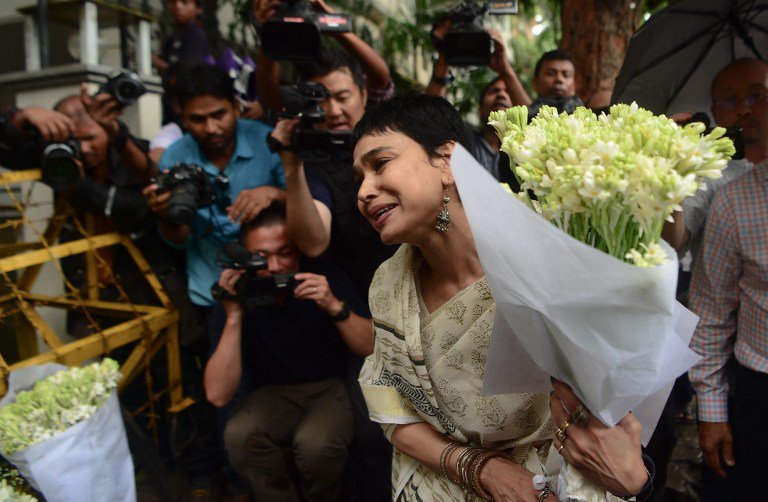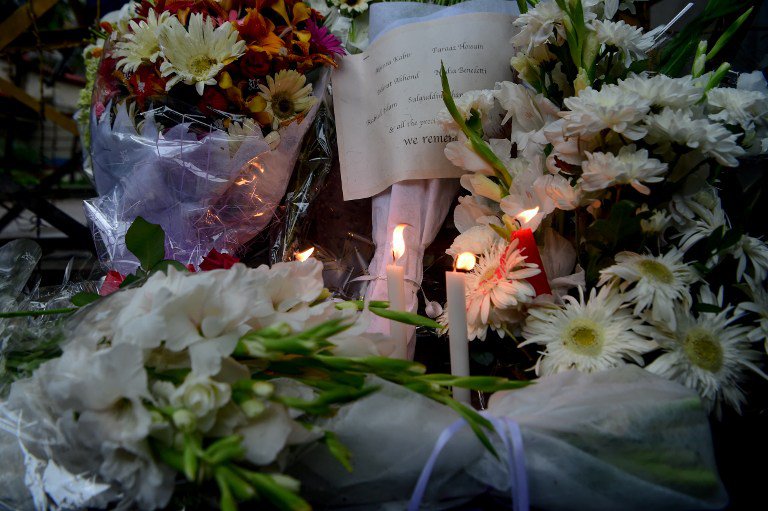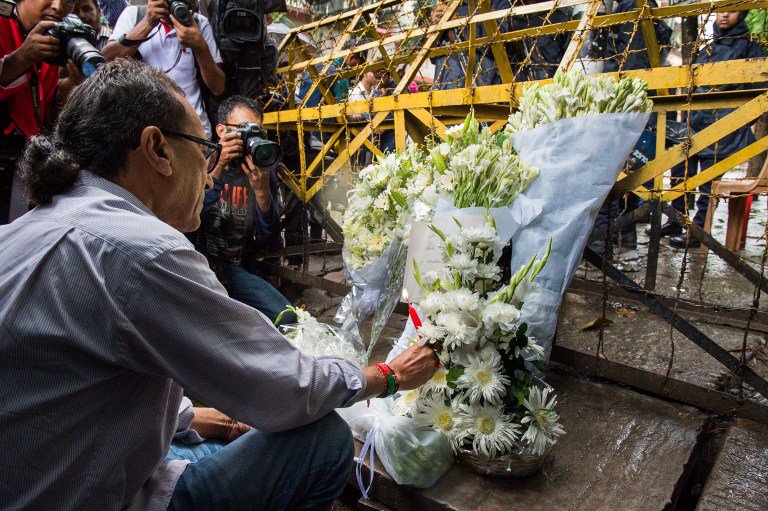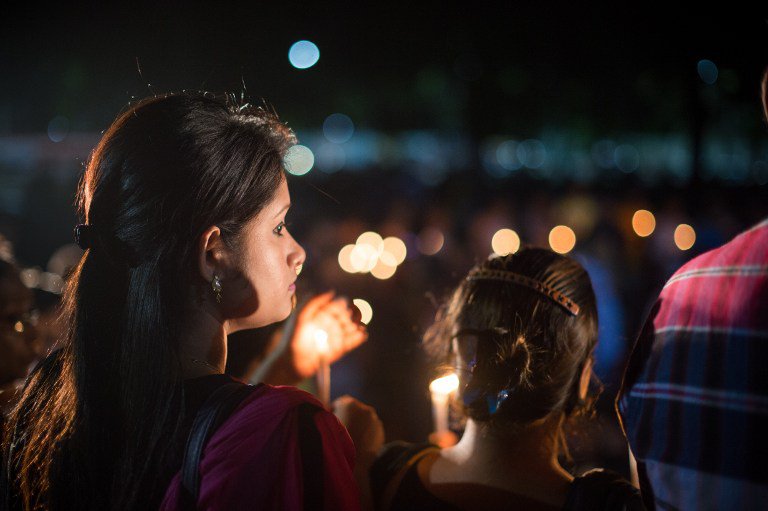Zainab Mustafá porta una foto de su marido, entre lágrimas busca noticias suyas y de sus dos hijos que salieron de casa la noche antes del atentado que este domingo golpeó Bagdad, reivindicado por el grupo Estado Islámico (EI).
=> Recibir por Whatsapp las noticias destacadas
Antes del alba, un kamikaze del grupo yihadista hizo estallar un coche bomba en una calle comercial del barrio Karrada de la capital iraquí, donde muchas personas suelen hacer sus compras antes de la fiesta del final del ramadán. Al menos 119 personas murieron y más de 180 resultaron heridas.
Los tres habían salido la noche del sábado a comprar ropa para la festividad. Desde entonces Zainab no ha tenido noticias. Ahora busca, en medio de los edificios todavía humeantes, saber algo de los suyos.
La potente explosión provocó incendios en muchos edificios aledaños y los bomberos siguen intentando controlar el fuego.
“Buscamos por todos lados”, relató Zainab, mientras camina por las calles, llenas de escombros, que auguran un búsqueda lenta.
“En las listas de víctimas, vi familias enteras, el padre, los hijos, la madre y las hijas, todos aniquilados por la explosión”, dijo un miembro de las fuerzas de Protección Civil. “Vamos necesitar muchos días para encontrar los cuerpos de las víctimas. Es una tarea difícil”, explicó.
Fadhel Salem busca a sus dos hermanos que se encontraban atendiendo el comercio familiar. “Creo que siguen en el interior pero no veo nada debido al espeso humo”, explicó.
– Pruebas de ADN –
En otra tienda, donde el techo se desplomó, cinco personas trabajaban con palas para intentar encontrar a sus seres queridos.
“Yo los conocía a todos”, contó Sami Kajim, mientras buscaba entre los restos del local.
Poco antes de la explosión, le llevó un vaso de jugo de frutas a su amigo Mustafá, antes de irse a su casa para dormir.
“Tras la explosión, solo había fuego, no podía ver a Mustafá porque todo el lugar estaba en llamas”, contó.
Bagdad ya había sufrido varios atentados este año, pero el ataque de este domingo, en el que los autores combinaron el uso de explosivos y obuses fue el más mortal en lo que va del año.
La identificación de las víctimas también planteará un desafío para las autoridades, ya que muchos restos están carbonizados al punto que será necesario someterlos a pruebas de ADN.
Sin embargo, pese a que decenas de personas perdieron la vida en la explosión y los incendios que se desataron a continuación, otros lograron escapar a la muerte.
“Algunos saltaron de los techos de los edificios, pese a la altura” y ahora están heridos con fracturas en las piernas, contó Sari Mohamed, propietario de una tienda.
“Tres personas se escondieron dentro de un refrigerador en el primer piso, tras el final del incendio lograron salir con vida”, explicó.
Este ataque se produjo una semana después de que el grupo Estado Islámico perdiera el control de Faluya, tras una ofensiva de la coalición internacional que duró varias semanas. AFP
Fotos AFP
- A woman speaks before leaving a floral arrangement at a road block leading to an upscale cafe that was the scene of a bloody attack in the Bangladesh capital Dhaka on July 3, 2016. Bangladesh began observing two days of national mourning July 3 after 20 hostages were slaughtered at a restaurant packed with foreigners in a terrifying escalation of a campaign of attacks by Islamist extremists. Seven Japanese nationals were killed in the attack. / AFP PHOTO / STR
- Candles and a sign bearing the names of some of the victims killed a bloody siege at an upscale cafe adorns one of many floral arrangements left near the restaurant in the Bangladesh capital Dhaka on July 3, 2016. Bangladesh began observing two days of national mourning July 3 after 20 hostages were slaughtered at a restaurant packed with foreigners in a terrifying escalation of a campaign of attacks by Islamist extremists. Seven Japanese nationals were killed in the attack. / AFP PHOTO / STR
- A Bangladeshi woman holds a photograph of her son, who worked at a cafe that was the scene of an attack and seige, and who is missing, in Dhaka on July 3, 2016. Bangladesh said July 3 the attackers who slaughtered 20 hostages at a restaurant were well-educated followers of a homegrown militant outfit who found extremism “fashionable”, denying links to the Islamic State group. As the country held services to mourn the victims of the siege in Dhaka, details emerged of how the attackers spared the lives of Muslims while herding foreigners to their deaths. / AFP PHOTO / APF / STR
- A Bangladeshi social activist lights a candle on floral arrangement that he placed on July 3, 2016 on a road block in Dhaka leading to an upscale cafe that was the site of a bloody siege. Bangladesh began observing two days of national mourning on July 3 after 20 hostages were slaughtered at a restaurant packed with foreigners in a terrifying escalation of a campaign of attacks by Islamist extremists. Seven Japanese and 9 Italian nationals were killed in the attack. / AFP PHOTO / ROBERTO SCHMIDT
- A note with the names of some of the victims that died in a bloody siege on an upscale cafe in Dhaka on July 1 can be read among floral arrangements left by well wishers at a road block leading to the cafe on July 3, 2016. Bangladesh began observing two days of national mourning on July 3 after 20 hostages were slaughtered at a restaurant packed with foreigners in a terrifying escalation of a campaign of attacks by Islamist extremists. Seven Japanese and 9 Italian nationals were killed in the attack. / AFP PHOTO / ROBERTO SCHMIDT
- A Bangladeshi woman sings a song for peace as she and dozens others gather in a park in for a candle-light vigil following an attack and seige in Dhaka on July 3, 2016. Bangladesh said July 3 the attackers who slaughtered 20 hostages at a restaurant were well-educated followers of a homegrown militant outfit who found extremism “fashionable”, denying links to the Islamic State group. As the country held services to mourn the victims of the siege in Dhaka, details emerged of how the attackers spared the lives of Muslims while herding foreigners to their deaths. / AFP PHOTO / ROBERTO SCHMIDT
- A Bangladeshi woman holds a lit candle as she joins others to wish for peace during a candle-light vigil following an attack and seige in Dhaka on July 3, 2016. Bangladesh said July 3 the attackers who slaughtered 20 hostages at a restaurant were well-educated followers of a homegrown militant outfit who found extremism “fashionable”, denying links to the Islamic State group. As the country held services to mourn the victims of the siege in Dhaka, details emerged of how the attackers spared the lives of Muslims while herding foreigners to their deaths. / AFP PHOTO / ROBERTO SCHMIDT
Fuente: lapatilla.com






